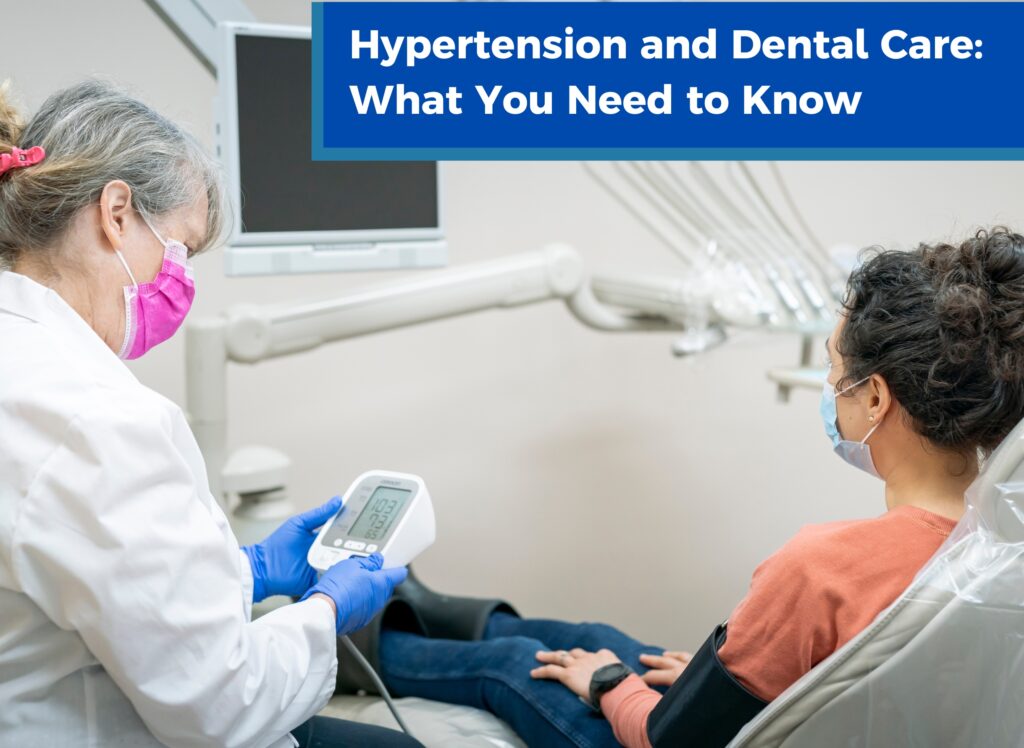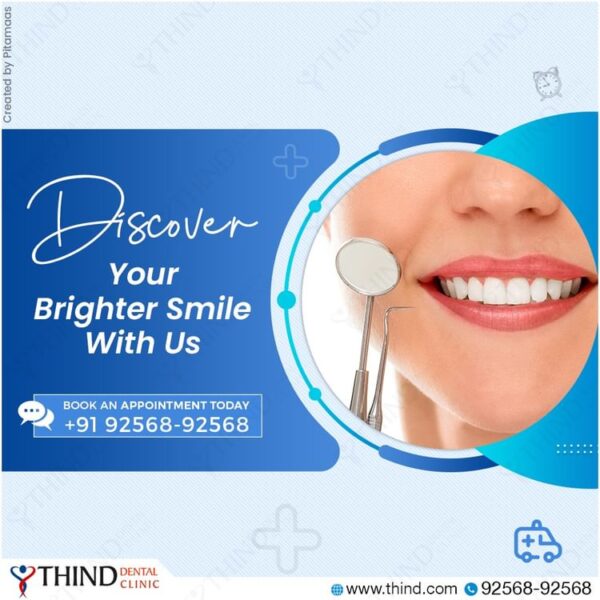Hypertension, also known as high blood pressure, is a widespread health condition that impacts millions of individuals globally. It is a serious medical condition in which the force of blood against the walls of the arteries is consistently too high. While hypertension primarily impacts the cardiovascular system, it can also have implications for oral health. As a trusted dental clinic in Ludhiana, Thind Dental Clinic recognizes the importance of understanding the link between hypertension and dental care. In this article, we will explore how hypertension can affect oral health, the significance of managing this condition during dental treatments, and the best practices for maintaining a healthy smile while living with hypertension.
The Connection between Hypertension and Oral Health
According to research, there is a symbiotic relationship between oral health and hypertension. On one hand, hypertension can increase the risk of certain oral health issues, and on the other hand, poor oral health may exacerbate hypertension. Understanding this connection is essential for providing comprehensive care to patients with hypertension.
Impact of Hypertension on Oral Health
1. Gum Disease: Hypertension may contribute to the development and progression of gum disease (periodontitis). Elevated blood pressure can weaken the immune system, making it harder for the body to fight off infections, including gum infections caused by bacteria in plaque. As a result, individuals with hypertension may be more susceptible to gum disease. Untreated gum disease can lead to gum recession, tooth loss, and other serious oral health complications.
2. Dry Mouth: Some medications used to treat hypertension can cause dry mouth (xerostomia) as a side effect. A dry mouth can lead to an imbalance of oral bacteria, increasing the risk of tooth decay and gum problems. Saliva plays a crucial role in neutralizing acids and washing away food particles, so reduced saliva flow can be detrimental to oral health. Individuals with dry mouths should stay hydrated and consider using artificial saliva products to alleviate discomfort.
3. Tooth Grinding (Bruxism): Hypertension is often associated with stress, and stress can lead to teeth grinding or clenching, known as bruxism. Over time, bruxism can wear down the tooth enamel, cause tooth sensitivity, and lead to dental problems such as cracked or broken teeth. Dentists may recommend the use of a mouthguard to protect the teeth and reduce the effects of bruxism.
4. Cardiovascular Concerns: While the focus of this article is on oral health, it is essential to recognize that hypertension also affects the cardiovascular system. Cardiovascular health is interconnected with overall well-being, and maintaining good oral health can positively impact cardiovascular health. Research suggests that individuals with periodontal disease may have a higher risk of developing heart disease and other cardiovascular conditions.
Managing Hypertension during Dental Treatments
For patients with hypertension, visiting the dentist for routine check-ups and dental treatments is still crucial. However, it is essential to communicate your hypertension diagnosis and any medications you are taking to your dentist. This information will help the dental team tailor treatments to your specific needs and ensure your safety during dental procedures.
Here are some guidelines to manage hypertension during dental visits:
1. Inform Your Dentist: Provide your dentist with a complete medical history, including any hypertension diagnosis and medications you are taking. This will help them make informed decisions about your treatment plan and avoid potential interactions with dental medications.
2. Blood Pressure Monitoring: For individuals with uncontrolled hypertension or significant cardiovascular concerns, the dental team may monitor your blood pressure before and during certain dental procedures. Keeping your blood pressure within a safe range is essential for your well-being.
3. Medication Management: If you are taking medications for hypertension, inform your dentist about them. Some drugs used to treat high blood pressure can interact with certain dental medications, so your dentist will need to be aware of your current prescription.
4. Stress Reduction Techniques: Dental anxiety can increase stress levels, potentially impacting blood pressure. Communicate any dental anxiety to your dentist, and they can suggest relaxation techniques or sedation options to help you feel more comfortable during dental treatments.
5. Regular Dental Check-ups: Regular dental check-ups are vital for everyone, including those with hypertension. Maintaining optimal oral health can reduce the risk of dental issues and contribute to overall well-being. Your dentist may recommend more frequent check-ups if you have specific oral health concerns related to hypertension.
Oral Care Tips for Individuals with Hypertension
To maintain good oral health while living with hypertension, follow these oral care tips:
1. Brush Twice Daily: Brush your teeth with fluoride toothpaste for at least two minutes, twice a day. Use a soft-bristled toothbrush to avoid damaging the gums. Brushing after meals can help remove plaque and food particles that can contribute to gum disease and tooth decay.
2. Floss Daily: Clean between your teeth and along the gumline daily with dental floss or interdental brushes. Plaque and food particles that brushing alone can miss are removed thanks to this. Flossing is especially important for individuals with hypertension, as it helps prevent gum disease and reduces the risk of inflammation in the body.
3. Choose Mouthwash Wisely: If you use mouthwash, opt for an alcohol-free formula to avoid dry mouth. Mouthwash can help reduce bacteria in the mouth and freshen breath, but alcohol-based products can worsen dry mouth symptoms.
4. Limit Sugary and Acidic Foods: Reduce the consumption of sugary and acidic foods and beverages that can contribute to tooth decay and erosion. These include sugary snacks, soft drinks, and acidic fruits. Instead, choose a healthy diet high in whole grains, fruits, and vegetables.
5. Stay Hydrated: Drink plenty of water throughout the day to promote saliva production and prevent dry mouth. Water is the best beverage for maintaining oral health and overall well-being.
Conclusion
Maintaining good oral health is essential for everyone, and this is especially true for individuals living with hypertension. By understanding the connection between hypertension and oral health and following the guidelines provided by your dentist, you can ensure a healthy smile and overall well-being. Regular dental check-ups, proper oral care at home, and open communication with your dentist are key to managing oral health while living with hypertension. At Thind Dental Clinic in Ludhiana, we are committed to providing comprehensive dental care and supporting our patients in their journey toward optimal oral health, even with hypertension.
For additional information or to arrange an appointment with us
You can contact us at +91-92568-92568
or visit us at:
THIND DENTAL CLINIC
11-12-13, 14 H.I.G Market, Opposite Water Tank, Ludhiana, Punjab 141010.
Also Read:
Single Sitting Procedure: Painless and Affordable Dental Care at Thind Dental Clinic
Dental Care for Children: Expert Tips for Parents on Caring for Your Child’s Teeth
The Importance and Benefits of Regular Dental Checkups: Ensuring Optimal Oral Health
Professional Dental Implants: Restoring Smiles with Precision and Care at Thind Dental Clinic in Ludhiana

 Timings
Timings


